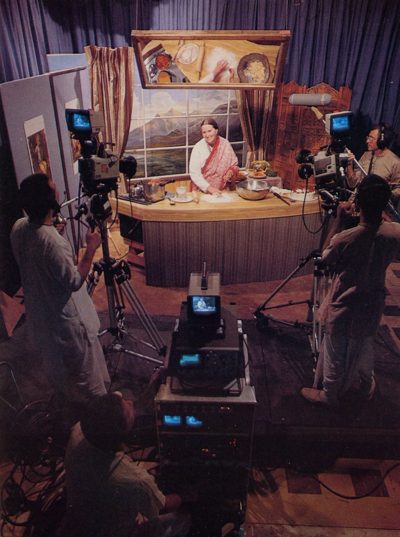At the ISKCON television network, devotees use their video skills to focus on reality.
"Here's your degree from The School of Illusion," said the dean of the London Film School as he handed graduate David Shapiro his master's degree on June 27, 1971. Later that day, while walking on Oxford Street, David met a devotee and received his First copy of Back to Godhead magazine. After reading it, David thought. This magazine makes sense.

ITV Studio
Three days later David flew back to his home in Chicago. But curiosity made his first stop the Hare Krsna temple he had seen listed in the magazine. "The moment I walked in the door in the middle of a Bhagavad-gita class, I felt I had really come home," David recalls. "Right away I loved the Deities, the devotees, the chanting, the philosophy, and of course the prasadam [spiritual food]. I didn't want to leave, so I stayed the night."
David would have lived and worked in the temple full time, but his mother strongly objected to his spiritual leanings. To placate her, David lived in the temple but worked outside doing animation films at Crocus Company in Evanston.
One of David's first jobs was a film called Gnosis. The Greek word gnosis refers to an intuitive apprehension of spiritual truths. In the Film a ball of clay comes into a world of nothingness and creates things for itself. David saw this as directly analogous to what he was learning in the Bhagavad-gita that the spirit soul is placed in the material world and, from its desire, creates an illusory world to enjoy. Not long after completing this film, David, now initiated and bearing the spiritual name Nrsimhananda dasa, moved to Los Angeles. Here he worked with Danny Thomas Productions, first as an assistant in the production of movies for television and eventually as a producer.
Five years later Nrsimhananda was ready to use his propensity and training fully in Krsna's service. In 1979 Nrsimhananda and Yadubara dasa founded ISKCON Television (ITV), dedicated to producing videos for spiritual enlightenment. Before long, Siddhanta dasa, an expert film editor, joined them, as did Ranadhira dasa, a marketer and writer.
"I'm fortunate to have found a way to engage in Lord Krsna's service and introduce others to Krsna consciousness," Nrsimhananda says. "Through videos, anybody can grasp the history, scope, and theological basis of Krsna consciousness and learn about His Divine Grace A. C. Bhaktivedanta Swami Prabhupada, ISKCON's founder-acarya."
In the eight years since its inception, ITV has produced over two hundred programs, including programs on vegetarianism and reincarnation, programs on special events and special people in Krsna consciousness, and programs on international spiritual festivals, temple openings, and the devotional arts of cooking and playing musical instruments. There are even special programs for children, including puppet shows. "There's an ITV video tape for everyone, whatever one's nationality, age, interests, familiarity or unfamiliarity with spiritual life," Nrsimhananda says.
ITV's Healthy, Wealthy and Wise is used widely by cable TV companies and universities and is distributed by Vegetarian Times. In fact, many Indians, both here and in India, have seen the show and been inspired to reject their Westernized diet and again become vegetarian. And, based on that show, many Westerners have begun to look askance at their nonvegetarian diet.
This year Mauritius television stations will air ITV programs on a weekly basis, and the broadcasting network of Tamil Nadu, India, will air ITV's Ramayana drama on statewide television to an audience of eighty million. In the U. S., cable TV stations have aired ITV's thirteen-part series Inside Hare Krsna. Such exposure has evoked interest where there was none, replaced disdain with inquiries, and caused many to reexamine their preconceptions about Krsna consciousness.
Entering ITV's studio and office in Culver City two blocks from the Los Angeles Hare Krsna community, one is impressed with the commitment that Nrsimhananda and the other devotees have given to this project. On a small bulletin board next to Siddhanta's editing room, the source of the ITV devotees' motivation and inspiration is revealed in a posted letter, dated March 22, 1972. The letter is from Srila Prabhupada to one of his disciples in Los Angeles:
If we are successful in this [television] programme, then my dreamt mission of life to spread Krsna consciousness all over the world will be fulfilled. I wish to speak on the great philosophy of Bhagawat Dharma (Krsna consciousness] at least once a week on television, so if arrangement is made by you for this, then you will be doing the highest service for Krsna.
ITV videos are now distributed on sankirtana as a visual form of Prabhupada's books, and thus Srila Prabhupada's desire is being fulfilled. "Materialistic films are measured by their box-office success," Nrsimhananda explains, "but our receipts are the people who are becoming more Krsna conscious. The feedback we get enlivens us in our devotional video service for Lord Krsna."
Nrsimhananda may have graduated from The School of Illusion, but now he's producing shows on reality shows that are touching people spiritually.
